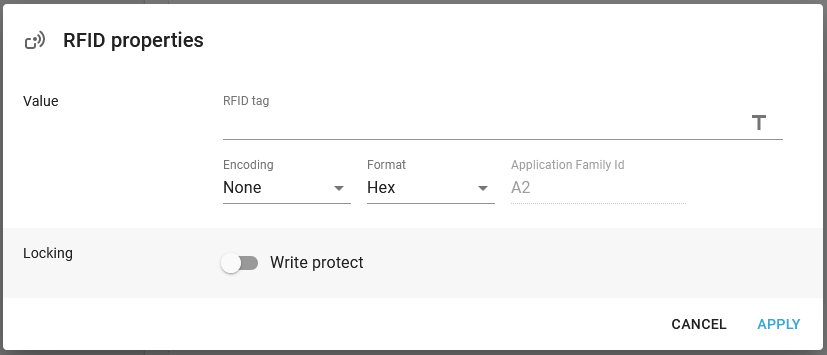If you have purchased the RFID module for InterFormNG2, then you can write information into RFID chips on RFID capable ZPL compatible printers.
Requirements
•The ZPL2 compatible printer must have RFID support.
•The RFID chips supported are EPC Generation 2 Class1.
•The license code for InterFormNG2 need to include the InterRFID module.
•An RFID tag element should be inserted in the designer to specify the data to write.
•Only up to one RFID element should be inserted be per page. Multiple RFID elements per page is unsupported.
•The printer is setup in InterFormNG2 as a normal ZPL compatible printer.

The RFID properties are:
RFID tag
The data, that you want to write into the RFID tag. It can e.g. be an XPath expression to build up a long string.
Encoding
Possible values are:
None:
If "None" is selected, then the raw value specified in "Selection input" will be written directly to the RFID chip.
ISO17367:
If "ISO17367" is selected, then the data provided in "Selection input" will be converted accordingly to ISO standard 17363-17367, before it is written to the RFID chip.
Format
If the encoding is set to none, then the format must be setup so that InterFormNG2 knows how to encode the input data:
Hex: The input data are hex characters, that defines the data to write. Here you should remember to set a header, that fits the number of bits, that you want to write. This is covered here: https://support.zebra.com/cpws/docs/rfid/UMI_Bit_Settings.htm and it means, that if you e.g. want to write 96 bits, then the header should be Hex 3000.
ASCII: The input data is the ascii string, that is to be written.
Application Family Id
This property is only applicable, if the encoding above is set to "ISO17367". If so, then this value will be used as the Application Family ID (AFI) in the RFID data. Only 2 digit hex codes are supported. If left empty it will default to the value 'A2'.
Write protect
States if the RFID chip should be write protected after the data has been written.